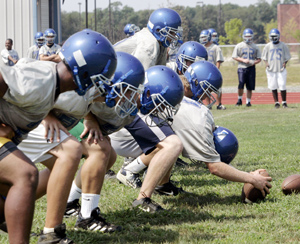| Home | Blog | Ask This | Showcase | Commentary | Comments | About Us | Contributors | Contact Us |

Brain injuries: something soldiers and athletes have in commonCOMMENTARY | October 284, 2007Soldiers may not be able to avoid traumatic brain injuries (TBI). Athletes can but too often won’t because their response to a concussion is to get back on the field as soon as they are able. The press, especially the regional press, can help alert youngsters to the dangers and consequences of TBI. By Patricia Block Traumatic brain injury, or TBI, as it is known to the millions of survivors of this horrible physical, cognitive and emotional malady, is widespread and getting worse. Often TBI can be avoided and for that reason the press – including the regional and small-town press – needs to do a better job explaining the dangers and consequences. The New York Times reported on the subject in a Sept. 15 article, “Silence on Concussions Raises Risks of Injury,” But the Times piece used the word “concussion” 30 times and the phrase “brain injury” only once. A concussion is a brain injury that may be very damaging but often, depending on the severity of the bruising, is not. If it is followed by additional concussions, the result can be life-changing. Do you know why high school football players stay silent on concussions? Most don’t understand the risks. Many said they “did not quite know what a concussion was and would never tell their coaches if they believed they had sustained one.” In my view, it is almost criminal to use the euphemism “concussion” to describe what a football player, or anyone suffering a head injury, has experienced. This word often downplays the severity of the injury, even if clashing helmets result in what is often referred to as a mild concussion (brain injury) and the player experiences temporary dizziness, headache, nausea, impaired vision or lethargy – i.e., what one of the players referred to as “you feel real sleepy.” Even if a player understands that continuing to play shortly after suffering a concussion may cause further and potentially irreversible and lethal damage to his brain, he will continue to play the game. As one of them said in the Times article, “You’ve got to sacrifice for the sake of the team. The only way I come out is on a stretcher.” Huge ego, reckless bravado and, let’s face it, flat-out ignorance. These young men either do not realize or want to acknowledge that whether they suffer a mild, moderate or severe TBI which, in worst cases, may lead to death, a brain injury often does result in cognitive, behavioral and psychosocial deficits that can significantly change their lives. After suffering a head injury, the victim may feel overwhelmed doing things that used to be simple. Planning, identifying priorities, figuring out the steps to complete a task and monitoring one’s own behavior are referred to as the “executive functions” of the brain. TBI survivors may become overwhelmed by the complexity of work requiring multiple steps. They will continue to use a strategy that has repeatedly shown to be ineffective, become easily frustrated and have difficulty controlling their emotions. They will overlook errors and often fail to complete a task before the next one is started. They will also have difficulties making decisions when faced with several choices. When it comes to TBI, survivors face challenges that are far more dramatic and life-changing than most can even begin to understand. The resulting cognitive deficits of TBI impact the survivor’s intellectual skills, behavior and quality of life and, to some degree – extraordinarily in some cases – their earnings potential. Since the war in Afghanistan, which began in 2001, about 2,100 troops there and in Iraq have been formally diagnosed with TBI. But officials estimate that up to 150,000 troops may have suffered concussions – mild TBIs – from roadside bomb attacks. According to the Defense and Veterans Brain Injury Center, a research and treatment agency run by the Pentagon and Veterans Affairs Department, 64 percent of injured troops have suffered brain injuries. The San Francisco Chronicle reported on Sgt. 1st Class Alec Geiss, of the Oregon National Guard, whose truck rolled over him as it crashed while avoiding a suspected land mine. Geiss’s wife noticed that after his return the easygoing, relaxed dad who went to Iraq had become a quick-tempered man who couldn’t remember the family’s daily schedule, jumped up screaming when the family cat landed on his bed and couldn’t tolerate crowds. Dr. Henry Lew of the Palo Alto VA Hospital says it is a very common scenario. “You don't see shrapnel or bullets or open injuries,” Lew says. “But the inside of the brain has been damaged to a point that it affects the daily function.” Veterans Affairs psychologist Harriet Zeiner says that often people will think a brain-injured vet is depressed or suffering from post-traumatic stress. “It's really important,” Zeiner says, “that individuals out in the public know that it's entirely possible for someone who's been in the combat theater to have a head injury and not know it.” Studies of more than 2,500 former National Football League players by the Center for the Study of Retired Athletes, the University of North Carolina, found that cognitive impairment, Alzheimer's-like symptoms and depression rose proportionately with the number of concussions they had sustained. That information, combined with the revelations that former Pittsburgh Steeler football players Mike Webster and Terry Long, who had repeated concussions throughout their careers and suffered from postconcussive brain dysfunction and mental impairment before their deaths, compelled Chris Nowinski – a former Harvard football player and professional wrestler whose repeated concussions ended his career and left him with severe migraines and depression – to expose the effects of contact-sport brain trauma examine and promote awareness of brain trauma's latent effects. Nowinski’s book, “Head Games: Football's Concussion Crisis,” detailed the public misunderstanding of concussions along with “the N.F.L.'s tobacco-industry-like refusal to acknowledge the depths of the problem.” The book revealed that Mr. Webster became homeless and cognitively impaired before dying of heart failure in 2002. Mr. Long committed suicide in 2005. Department of Defense statistics show that, in Iraq, approximately 514 U.S. soldiers are wounded every month and that approximately two-thirds of those wounded suffer a TBI. Does this mean that by 2008, another 1,028 soldiers will have suffered a traumatic brain injury? TBI is known as the “invisible injury.” Do boys playing football and men at war understand the Russian roulette they’re playing with their future? Football, obviously, is not going away. When it comes to the war, however, we do have a choice. A way must be found to end this hellish legacy of cognitive carnage.
|
||||||||||||




